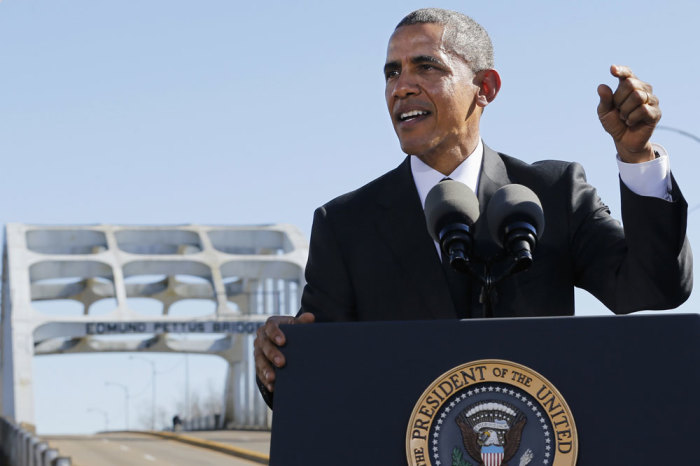Obama Says Requiring Every American to Vote Would 'Completely Change Political Map'

President Barack Obama has said that making voting in elections a mandatory obligation for Americans would be "potentially transformative" and possibly counteract the influence of money in elections. White House Press Secretary Josh Earnest said Thursday, however, that the president wasn't making a "specific policy prescription."
"If everybody voted, then it would completely change the political map in this country," Obama said in a speech on Wednesday in Cleveland, Ohio, according to The Associated Press. He added that universal voting would "counteract money more than anything," when talking on the subject of the influence of money in elections.
Obama said that the U.S. could follow Australia's model, where citizens are required to vote.
He added that many Americans who skip voting are younger, lower-income, immigrants, or minorities.
"There's a reason why some folks try to keep them away from the polls," the president said, referring to voter ID laws.
The Institute for Democracy and Electoral Assistance notes that 26 countries have mandatory voting laws. Refusing to vote is punishable by a fine in countries like Australia and Belgium.
The U.S. has had to deal with some of lowest voter turnout rates among developed countries, with less than 37 percent of the eligible voters in the 2014 midterm elections turning up to vote. The Pew Charitable Trusts pointed out that as many as 144 million Americans did not vote in the midterms.
Some, such as Haydon Manning, associate professor at Flinders University in Australia, have said that making voting mandatory carries its own dangers as well.
"Turning the vote out might not be a problem, but wooing disengaged citizens now requires banal sloganeering and crass misleading negative advertising," Manning said, according to CNN. "To me, this can diminish the democratic experience for those who take the time to think through the issues."
Dylan Matthews of Vox.com offered that mandatory voting would not by itself benefit one party over another.
"But it would, by definition, mean that more Americans' views are represented in government, and in particular that minorities and economically vulnerable people would have more of a voice. And both parties should be competing for their vote, rather than being able to ignore their needs. It may be, in the end, that Republicans win that competition — but first it has to be a competition," he suggested.
"The best objection to compulsory voting is that it impinges on peoples' freedom to not vote. But we make citizens perform actions for the collective benefit of society all the time, including everything from objections to mandatory jury duty to taxes to the individual mandate for health insurance. In each of those cases, there's a collective action problem."




























